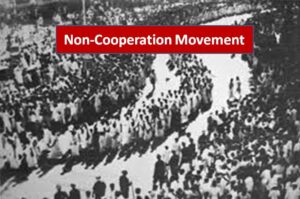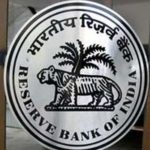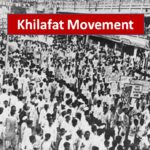What is The Non Cooperation Movement- Reasons, Decisions and Result
Hello friends today we are going to discuss about most important step taken towards India’s Independence that is the Non-Cooperation Movement. This movement was considered as milestone as it gave a direction to Indians to free their country from British rule. So today we shall discuss that what is the Non Cooperation Movement? Why this movement was Started? What were steps followed in Non Cooperation Movement and its final result. So let us discuss each of this details one by one. It will help everyone to increase General Knowledge especially for students preparing for government jobs in India.
What is the Non Cooperation Movement?
The Non-Cooperation Movement played a vital role in shaping up India’s independence struggle. It showed a unity of Indian people from different religions and areas against British colonial rule. This shown the power of nonviolent resistance as a means of achieving political objectives.
When was The Non Cooperation Movement Launched and by Whom?
 This movement was launched by Mahatama Gandhiji on on August 1, 1920. A special session of the All India Congress Committee in Calcutta was called. This country wide movement gained momentum and spread all over the country. The motive was to challenge the British Government by boycotting British institutions, products, and participating in nonviolent civil disobedience. People from every community participated in this non-violence movement. However due to some unfortunate incidents the nationwide movement was suspended by Mahatma Gandhiji. Although, the main motive of The Non Cooperation Movement was not achieved but, sill it ignited the minds of Indian people. They could sense that it is possible to put pressure on British Government with peaceful protests.
This movement was launched by Mahatama Gandhiji on on August 1, 1920. A special session of the All India Congress Committee in Calcutta was called. This country wide movement gained momentum and spread all over the country. The motive was to challenge the British Government by boycotting British institutions, products, and participating in nonviolent civil disobedience. People from every community participated in this non-violence movement. However due to some unfortunate incidents the nationwide movement was suspended by Mahatma Gandhiji. Although, the main motive of The Non Cooperation Movement was not achieved but, sill it ignited the minds of Indian people. They could sense that it is possible to put pressure on British Government with peaceful protests.
Causes of Non-Cooperation Movement
There are multiple reasons behind the start of The Non-Cooperation Movement. All the reasons were so serious that there seemed no other option rather than boycott. Below are the major reasons why the nationwide movement was started:-
Jallianwala Bagh Massacre: On 13th April, 1919, at Jallianwala Bagh British troops opened fire on a peaceful gathering, resulted in the loss of hundreds of innocent lives. Many people including famous personalities of India like Mahatma Gandhi were deeply hurt by the incident. This atrocity stirred widespread outrage and became a catalyst for the Non-Cooperation Movement.
Khilafat Movement: The Khilafat Movement was launched by Indian Muslims in support of the Ottoman Caliphate. They aimed to protect the interests of the Muslim community against British rules. Mahatma Gandhi along with Muslim leader of Khilafat Movement merged their objectives.
Rowlatt Act: The Rowlatt Act of 1919, was another atrocity by the British Government. This act granted the government powers to arrest and detain individuals without trial. This was clearly a suppression of liberty. People were so much angry against such rules. This act raised the demand for freedom by the Indian people.
Economic Exploitation: The British policies imposed on Indians were making them hard to earn. The economic hardships on the Indian population such as high taxes, restricted trade, and exploitation of local industries were major ones. These factors contributed to the growing discontent and desire for independence.
Main Activities of non-cooperation movement – Role of Mahatma Gandhiji
Mahatma Gandhi was the main face behind this activity. He issued a manifesto declaring a doctrine of the non-violent non-cooperation movement. Following were the main things which Gandhiji wanted from people of India:
- Swadeshi Apnao- Adopt hand spinning & weaving
- Work for the eradication of untouchability from society
- Boycott British Goods and Products
Effects of the Non-Cooperation Movement – Results
Mass Mobilization: The movement received a massive response from public. This was one of the highest public participation movement of India. The people from all walks of life uniting against British rule. The prime motive was not achieved but Indians boycotted British institutions, refused to pay taxes, and boycotted British goods, leading to significant economic disruption.
Formation of Swaraj Party: The Non-Cooperation Movement divided the Indian National Congress into two parts. The group which was not agree with suspension of the movement, formed the Swaraj Party to participate in legislative activities while advocating for self-rule.
Rise of New Leaders: The movement provided a growing platform for emerging leaders like Jawaharlal Nehru, Vallabhbhai Patel, and Subhas Chandra Bose. These later played pivotal roles in the freedom struggle.
Repressive Measures: The British authorities were very much frustrated with the movement. In response they started arresting the main faces. Thousands of activists, including Gandhi himself were arrested. This led to a temporary lull in the movement but also served as a catalyst for future resistance.
The Indian National Congress (INC) withdrawing its support for British reforms following the Rowlatt Act of 18 March 1919
Why Was The Non Cooperation Movement not Successful?
The main reason Behind Failure of Non Cooperation Movement was the Chauri Chaura Incident. On February 4, 1922 but, people were doing peaceful protest. But the protest took a turn. Police tried to suppress the protest. The protesters also got angry and in reply they attacked the police station in Chauri Chaura causing the death of 22 police officers.



